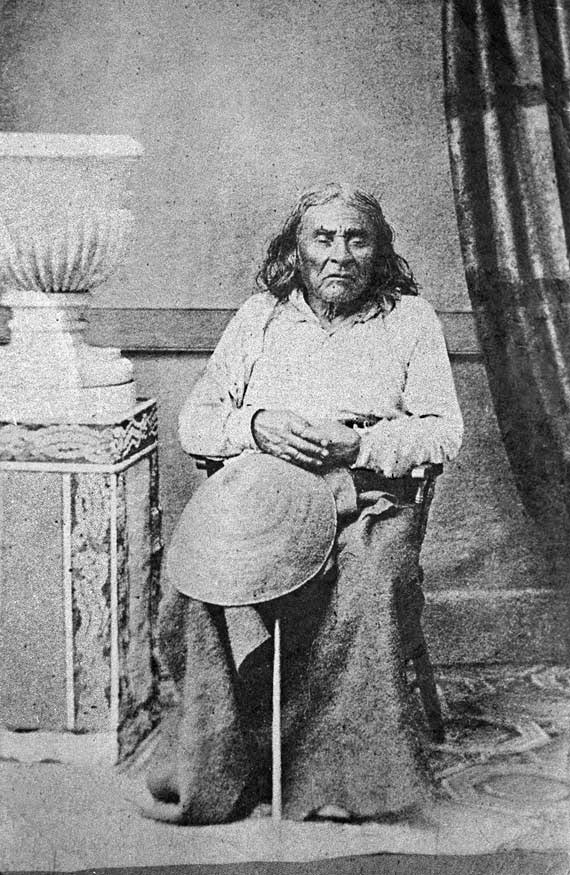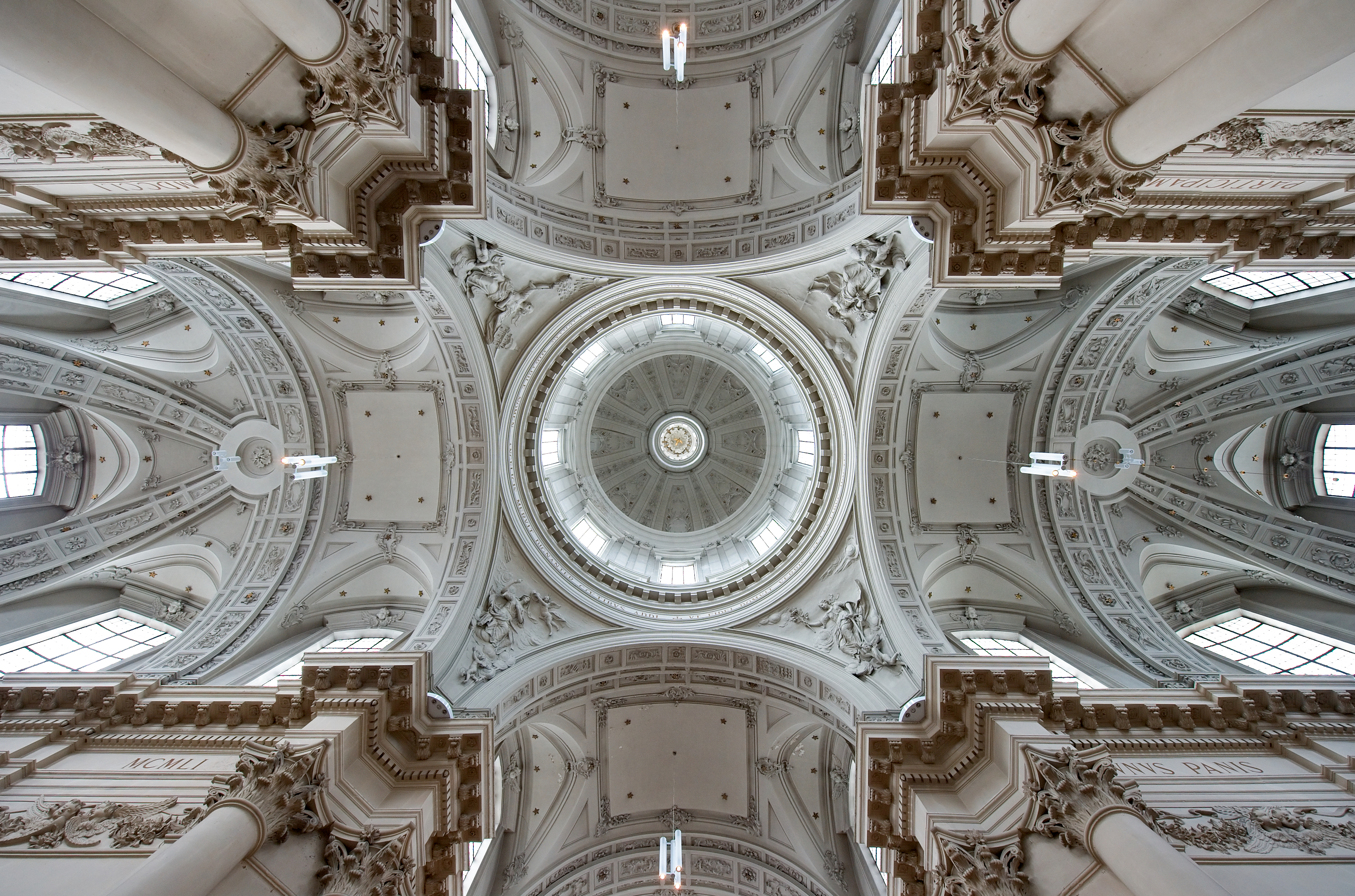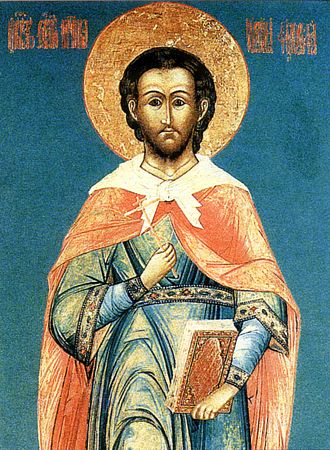 |
| Biletet er henta frå Commons og er tatt av Yuri Beletsky på eit observatrium der ein skyt laser ut i rommet. |
søndag 26. juni 2011
Commons Picture of the Year 2010
Eg vurderte tidlegare dei bileta som var aktuelle for meg å stemme på i «Commons Picture of the Year 2010». Resultatet er klart, og ikkje overraskande var det eit svært spektakulært bilete frå romforskninga som vann.
søndag 19. juni 2011
William Allingham
Dei siste dagane har eg lagt ut tre dikt av William Allingham, ein diktar som for meg var heilt ukjent fram til torsdag. Då sat eg og bladde i monsterboka The Penguin Book of Victorian Verse, ein murstein eg plukka med meg på eit posesal ein gong. I boka fann eg det sympatiske diktet «The Fairy King», og fann fleire artige dikt av Allingham på nettet.
The Penguin Book of Victorian Verse sa ikkje så mykje om fyren, berre at han var ein irsk poet og journalist. Wikipedia hadde heldigvis litt meir. Allingham levde dei tre siste firedelane av 1800-talet. Han var som sagt irsk og skreiv mange dikt der irsk nasjonalkjensle var framtredande. Det er kanskje det som gjer at eg liker desse dikta, for mykje av den irske folkloren kjenner ein att frå moderne fantastisk litteratur. Då er det kanskje ikkje så rart heller om Allingham har påverka den fantastiske litteraturen. Eit rykte som går på nettet, men som eg ikkje har fått stadfesta, seier at Terry Pratchett brukte ei linje frå Allingham sitt dikt «The Fairies» som arbeidstittel for boka som til slutt fekk namnet The Wee Free Men. (For å bruke Wikipediaspråk: Trenger referanse) Uansett er dei dikta eg har lese artige. Ein skal ikkje sjå vekk frå at det kan dukke opp fleire dikt av William Allingham på St. Isidors minne.
 |
| William Allingham. Biletet er henta frå Wikimedia Commons. |
Kategoriar:
Historie,
Litteratur,
Poesi,
William Allingham
lørdag 18. juni 2011
The Abbot of Innisfallen
The Abbot of Innisfallen
awoke ere dawn of day;
Under the dewy green leaves
went he forth to pray.
The lake around his island
lay smooth and dark and deep,
And wrapt in a misty stillness
the mountains were all asleep.
Low kneel'd the Abbot Cormac
when the dawn was dim and gray;
The prayers of his holy office
he faithfully 'gan say.
Low kneel'd the Abbot Cormac
while the dawn was waxing red;
And for his sins' forgiveness
a solemn prayer he said:
Low kneel'd that holy Abbot
while the dawn was waxing clear;
And he pray'd with loving-kindness
for his convent-brethren dear.
Low kneel'd that blessed Abbot
while the dawn was waxing bright;
He pray'd a great prayer for Ireland,
he pray'd with all his might.
Low kneel'd that good old Father
while the sun began to dart;
He pray'd a prayer for all men,
he pray'd it from his heart.
His blissful soul was in Heaven,
tho' a breathing man was he;
He was out of time's dominion,
so far as the living may be.
The Abbot of Innisfallen
arose upon his feet;
He heard a small bird singing,
and O but it sung sweet!
It sung upon a holly-bush,
this little snow-white bird;
A song so full of gladness
he never before had heard.
It sung upon a hazel,
it sung upon a thorn;
He had never heard such music
since the hour that he was born.
It sung upon a sycamore,
it sung upon a briar;
To follow the song and hearken
this Abbot could never tire.
Till at last he well bethought him;
he might no longer stay;
So he bless'd the little white singing-bird,
and gladly went his way.
But, when he came to his Abbey,
he found a wondrous change;
He saw no friendly faces there,
for every face was strange.
The strange men spoke unto him;
and he heard from all and each
The foreign tongue of the Sassenach,
not wholesome Irish speech.
Then the oldest monk came forward,
in Irish tongue spake he:
'Thou wearest the holy Augustine's dress,
and who hath given it to thee?'
'I wear the Augustine's dress,
and Cormac is my name,
The Abbot of this good Abbey
by grace of God I am.
I went forth to pray, at the dawn of day;
and when my prayers were said,
I hearken'd awhile to a little bird,
that sung above my head.'
The monks to him made answer,
'Two hundred years have gone o'er,
Since our Abbot Cormac went through the gate,
and never was heard of more.
Matthias now is our Abbot,
and twenty have pass'd away.
The stranger is lord of Ireland;
we live in an evil day.'
'Days will come and go,' he said,
'and the world will pass away,
In Heaven a day is a thousand years,
a thousand years are a day.'
'Now give me absolution;
for my time is come,' said he.
And they gave him absolution,
as speedily as might be.
Then, close outside the window,
the sweetest song they heard
That ever yet since the world began
was utter'd by any bird.
The monks look'd out and saw the bird,
its feathers all white and clean;
And there in a moment, beside it,
another white bird was seen.
Those two they sang together,
waved their white wings, and fled;
Flew aloft, and vanish'd;
but the good old man was dead.
They buried his blessed body
where lake and green-sward meet;
A carven cross above his head,
a holly-bush at his feet;
Where spreads the beautiful water
to gay or cloudy skies,
And the purple peaks of Killarney
from ancient woods arise.
«The Abbot of Innisfallen» er skreve av William Allingam og kan mellom anna finnast hjå Project Gutenberg.
fredag 17. juni 2011
The Leprechaun; or Fairy Shoemaker
I.
Little Cowboy, what have you heard,
Up on the lonely rath's green mound?
Only the plaintive yellow bird
Sighing in sultry fields around,
Chary, chary, chary, chee-ee!--
Only the grasshopper and the bee?--
"Tip-tap, rip-rap,
Tick-a-tack-too!
Scarlet leather, sewn together,
This will make a shoe.
Left, right, pull it tight;
Summer days are warm;
Underground in winter,
Laughing at the storm!
Lay your ear close to the hill.
Do you not catch the tiny clamour,
Busy click of an elfin hammer,
Voice of the Lepracaun singing shrill
As he merrily plies his trade?
He's a span
And a quarter in height.
Get him in sight, hold him tight,
And you're a made
Man!II.
You watch your cattle the summer day,
Sup on potatoes, sleep in the hay;
How would you like to roll in your carriage.
Look for a duchess's daughter in marriage?
Seize the Shoemaker--then you may!
"Big boots a-hunting,
Sandals in the hall,
White for a wedding-feast,
Pink for a ball.
This way, that way,
So we make a shoe;
Getting rich every stitch,
Tick-tack-too!"
Nine-and-ninety treasure-crocks
This keen miser-fairy hath,
Hid in mountains, woods, and rocks,
Ruin and round-tow'r, cave and rath,
And where the cormorants build;
From times of old
Guarded by him;
Each of them fill'd
Full to the brim
With gold!III.
I caught him at work one day, myself,
In the castle-ditch, where foxglove grows,--
A wrinkled, wizen'd and bearded Elf,
Spectacles stuck on his pointed nose,
Silver buckles to his hose,
Leather apron-shot in his lap--
"Rip-rap, tip-tap,
Tick-tack-too!
(A grasshopper on my cap!
Away the moth flew!)
Buskins for a fairy prince,
Brogues for his son,--
Pay me well, pay me well,
When the job is done! "
The rogue was mine, beyond a doubt.
I stared at him; he stared at me;
"Servant, Sir!" "Humph!" says he,
And pull'd a snuff-box out.
He took a long pinch, look'd better pleased,
The queer little Lepracaun;
Offer'd the box with a whimsical grace,-
Pouf! he flung the dust in my face,
And, while I sneezed,
Was gone!
«The Leprechaun; or Fairy Shoemaker» er skreve av William Allingham. Teksten er henta frå Wikisource.
onsdag 15. juni 2011
The Fairy King
The Fairy King was old.
He met the Witch of the wold.
'Ah ha, King!' quoth she,
'Now thou art old like me.'
'Nay, Witch!' quoth he,
'I am not old like thee.'
The Kong took off his crown,
It almost bent him down;
His age was too great
To carry such a weight.
'Give it me!' she said,
And clapt it on her head.
Crown sank to ground;
The Witch no more was found.
The sweet spring-songs were sung,
The Fairy King grew young,
His crown was made of flowers,
He lived in woods and bowers.
«The Fairy King» er skreve av William Allingham. Det kan mellom anna lesast her.
fredag 10. juni 2011
Er dette å vere bibeltru?
Å kalle seg "bibeltru" eller seie at det ein hevdar er eit "bibelsk prinsipp" eller liknande er eit mykje brukt retorisk verkemiddel eg ikkje har særleg mykje til overs for. Særleg fordi det i dette ligg ei implisitt nedvurdering av dei som hevdar noko anna. Det er også svært uklårt kva som ligg i det å til dømes vere "bibeltru". Er det kanskje noko ala dette?
God pinsehelg!

God pinsehelg!
tirsdag 7. juni 2011
Høvding Seattles tale
 |
| Høvding Seattle. Biletet er henta frå Commons. |
Talen skal han ha halde i 1854, og er her attgjeve slik Seattle Sunday Star har publisert han. Teksten er henta frå Wikisource.
"Yonder sky has wept tears of compassion on our fathers for centuries untold, and which, to us, looks eternal, may change. Today it is fair, tomorrow it may be overcast with clouds. My words are like the stars that never set. What Seattle says, the great chief, Washington [1], can rely upon, with as much certainty as our pale-face brothers can rely upon the return of the seasons. The son of the white chief says his father sends us greetings of friendship and good will. This is kind, for we know he has little need of our friendship in return, because his people are many. They are like the grass that covers the vast prairies, while my people are few, and resemble the scattering trees of a storm-swept plain. The great, and I presume also good, white chief sends us word that he wants to buy our lands but is willing to allow us to reserve enough to live on comfortably. This indeed appears generous, for the red man no longer has rights that he need respect, and the offer may be wise, also, for we are no longer in need of a great country.
"There was a time when our people covered the whole land, as the waves of a wind-ruffled sea cover its shell-paved floor. But that time has long since passed away with the greatness of tribes now almost forgotten. I will not mourn over our untimely decay, nor reproach my pale-face brothers for hastening it, for we, too, may have been somewhat to blame.
"When our young men grow angry at some real or imaginary wrong, and disfigure their faces with black paint, their hearts, also, are disfigured and turn black, and then their cruelty is relentless and knows no bounds, and our old men are not able to restrain them. But let us hope that hostilities between the red-man and his pale-face brothers may never return. We would have everything to lose and nothing to gain. True it is, that revenge, with our young braves, is considered gain, even at the cost of their own lives, but old men who stay at home in times of war, and old women, who have sons to lose, know better.
"Our great father Washington, for I presume he is now our father as well as yours, since George has moved his boundaries to the north; our great and good father, I say, sends us word by his son, who, no doubt, is a great chief among his people, that if we do as he desires, he will protect us. His brave armies will be to us a bristling wall of strength, and his great ships of war will fill our harbors so that our ancient enemies far to the northward, the Simsiams and Hydas, will no longer frighten our women and old men. Then will he be our father and we will be his children.
"But can this ever be? Your God loves your people and hates mine; he folds his strong arms lovingly around the white man and leads him as a father leads his infant son, but he has forsaken his red children; he makes your people wax strong every day, and soon they will fill all the land; while my people are ebbing away like a fast-receding tide, that will never flow again. The white man's God cannot love his red children or he would protect them. They seem to be orphans and can look nowhere for help. How then can we become brothers? How can your father become our father and bring us prosperity and awaken in us dreams of returning greatness? Your God seems to us to be partial. He came to the white man. We never saw Him; never even heard His voice. He gave the white man laws, but He had no word for His red children whose teeming millions filled this vast continent as the stars fill the firmament. No, we are two distinct races and must ever remain so. There is little in common between us.
"The ashes of our ancestors are sacred and their final resting place is hallowed ground, while you wander away from the tombs of your fathers seemingly without regret. Your religion was written on tablets of stone by the iron finger of an angry God, lest you might forget it. The red man could never remember nor comprehend it. Our religion is the traditions of our ancestors, the dreams of our old men, given them by the great Spirit, and the visions of our sachems, and is written in the hearts of our people. Your dead cease to love you and the homes of their nativity as soon as they pass the portals of the tomb. They wander far off beyond the stars, are soon forgotten, and never return. Our dead never forget the beautiful world that gave them being. They still love its winding rivers, its great mountains and its sequestered vales, and they ever yearn in tenderest affection over the lonely hearted living and often return to visit and comfort them. Day and night cannot dwell together. The red man has ever fled the approach of the white man, as the changing mists on the mountain side flee before the blazing morning sun. However, your proposition seems a just one, and I think that my folks will accept it and will retire to the reservation you offer them, and we will dwell apart in peace, for the words of the great white chief seem to be the voice of nature speaking to my people out of the thick darkness that is fast gathering around them like a dense fog floating inward from a midnight sea.
"It matters but little where we pass the remainder of our days. They are not many. The Indian's night promises to be dark. No bright star hovers about the horizon. Sad-voiced winds moan in the distance. Some grim Nemesis of our race is on the red man's trail, and wherever he goes he will still hear the sure approaching footsteps of the fell destroyer and prepare to meet his doom, as does the wounded doe that hears the approaching footsteps of the hunter.
"A few more moons, a few more winters, and not one of all the mighty hosts that once filled this broad land or that now roam in fragmentary bands through these vast solitudes will remain to weep over the tombs of a people once as powerful and as hopeful as your own. But why should we repine? Why should I murmur at the fate of my people? Tribes are made up of individuals and are no better than they. Men come and go like the waves of the sea. A tear, a tamanamus, a dirge, and they are gone from our longing eyes forever. Even the white man, whose God walked and talked with him, as friend to friend, is not exempt from the common destiny. We may be brothers, after all. We shall see.
"We will ponder your proposition, and when we have decided we will tell you. But should we accept it, I here and now make this the first condition: That we will not be denied the privilege, without molestation, of visiting at will the graves of our ancestors and friends. Every part of this country is sacred to my people. Every hill-side, every valley, every plain and grove has been hallowed by some fond memory or some sad experience of my tribe. Even the rocks that seem to lie dumb as they swelter in the sun along the silent seashore in solemn grandeur thrill with memories of past events connected with the fate of my people, and the very dust under your feet responds more lovingly to our footsteps than to yours, because it is the ashes of our ancestors, and our bare feet are conscious of the sympathetic touch, for the soil is rich with the life of our kindred. The noble braves, and fond mothers, and glad-hearted maidens, and the little children who lived and rejoiced here, and whose very names are now forgotten, still love these solitudes, and their deep fastnesses at eventide grow shadowy with the presence of dusky spirits. And when the last red man shall have perished from the earth and his memory among white men shall have become a myth, these shores shall swarm with the invisible dead of my tribe, and when your children's children shall think themselves alone in the field, the store, the shop, upon the highway or in the silence of the woods they will not be alone. In all the earth there is no place dedicated to solitude. At night, when the streets of your cities and villages shall be silent and you think them deserted, they will throng with the returning hosts that once filled and still love this beautiful land. The white man will never be alone. Let him be just and deal kindly with my people, for the dead are not altogether powerless."
søndag 5. juni 2011
Dagen i dag bør verte ny fridag
 |
| Logoen til Miljøverndagen 2011. |
Dette meiner eg er eit godt forslag. 1. mai har sin misjon som ein dag der ein har markert arbeidarklassa sin kamp mot kapitalmakta. 5. juni kan verte ein dag der ein markerer miljøet sin kamp mot kapitalmakta. Der arbeidarkamp var den store og viktige kampen i dei to førre hundreåra er no miljøkampen den soleklart viktigaste kampen vi kjempar. Tapar vi denne er det ikkje sikkert dei andre kampane våre vil stå att som særleg viktige...
Samstundes som Vårt Land skreiv om dette, hadde dei også ei lita sak om korleis haldningane våre til miljøvern påverkar dagleglivet vårt. Det viser seg at dei med positive haldningar til miljøvern er flinke til å sortere avfall og liknande, men når det kjem til transport er ein ikkje like flink, sjølv om det faktisk er transporten vår som er det som gjev utslag.
Eg trur det er ein enkel grunn til dette. Slik ein har styrt landet vårt er ikkje det å reise kollektivt eit reelt alternativ til å køyre sjølv for svært mange, særleg i distrikta. Og medan ein har bygd ut flyplassane har ein late jernbanenettet råtne på rot, noko som gjer at det å ta toget mellom Oslo og Bergen kan vere ein langdryg og ukomfortabel affære, som i tillegg ofte er dyrare enn å fly.
 Eg meiner at før ein brukar meir pengar på å bygge ut flyplassane i Norge må ein sørgje for at ein får eit moderne jernbanenett der det går lyntog mellom alle dei største byane våre. Gjer ein dette vil ein nok sjå at ein ikkje treng bygge ut flyplassane. Vert tog eit reelt alternativ til fly for den jamne reisande vil nok dei fleste velgje å reise raskt og komfortabelt frå sentrum til sentrum.
Eg meiner at før ein brukar meir pengar på å bygge ut flyplassane i Norge må ein sørgje for at ein får eit moderne jernbanenett der det går lyntog mellom alle dei største byane våre. Gjer ein dette vil ein nok sjå at ein ikkje treng bygge ut flyplassane. Vert tog eit reelt alternativ til fly for den jamne reisande vil nok dei fleste velgje å reise raskt og komfortabelt frå sentrum til sentrum.Miljøpartiet Dei Grøne stiller til val i alle fylker i haust. I tillegg stiller vi i mange kommunar. Sjølv står eg på lista til Miljøpartiet Dei Grøne Lindås, og er faktisk også listefyll på fylkeslista, den lista Tom Sverre Tomren toppar. Sjå etter lista frå Miljøpratiet Dei Grøne når du skal stemme i haust!
Kategoriar:
MDG,
Merkedagar,
Miljøvern,
Politikk,
Samfunn
onsdag 1. juni 2011
Vanskeleg val....
Årets bilete på Commons skal kårast og då må det sjølvsagt stemmast. Første runde var grei, då kunne ein stemme på fleire bilete. Eg stemte på eit bilete i dei fleste kategoriane og var glad for at eg slapp å velgje eitt. Men no må eg det. Eg vil vurdere dei mest aktuelle kandidatane her på bloggen, men om du vil sjå alle bileta finn ein dei på denne sida på Commons. Om nokon har sterke tankar om kva eg skal stemme kan ein påverke i kommentarfeltet. Avstemninga sluttar 7. juni, så eg har ei veke på meg.
Dette er altså dei kandidatane eg vurderer. Det kan sikkert argumenterast godt for at eg ser meir på det spektakulære/vakre i motivet enn det fototekninske eller informasjonsverdien i biletet. Dette er rett, men eg er ein absolutt legmann når det kjem til fotografi.
 |
| The Garden of Earthly Delights av Hieronymus Bosch For: Fabelaktig maleri av ein artig kunstnar. Flotte detaljar, fargar og tema. Mot: Vil helst stemme på eit nytt fotografi og ikkje eit maleri som er hundrevis av år. På grunn av storleiken på fila er dette ein mindre versjon av fila. |
 |
| Schloss Lichtenstein fotografert av -donald-. For: Herleg fantasy-kjensle over biletet. Minner meg om ein av borgane i A Song of Ice and Fire. Fint motiv og fint utført. Mot: Kan det verte litt kjedeleg? |
 |
| Sørleg elefantsel fotografert av Butterfly austral. For: Bra bilete av ein sel i det fri. Mot: Unødvendig å plage ein sel for å få eit bilete. Eg ser for meg at fotografen sit rett forran den redde selen. |
 |
| Golden Gate fotografert av Mbz1 For: Stileg bilete naturfenomen med all skodda rundt brua. Mot: Kan kanskje verte litt kjedeleg med så lite som skjer i biletet? |
| Angripande leopard fotografert av Leo za1. For: Fantastisk bilete. Ein lurar på kva som skjer med fotografen rett etterpå. Konsentrert blikk på leoparden. Mot: Lite talar mot anna enn at eg er usikker på om dette er det aller beste av dei mange gode. |
 |
| Laserskot frå romstasjon. For: Spanande bilete frå rommet. Gjev innsyn i noko vi aldri ellers ville sett. Mot: Usikker på om slike bilete frå milliardprosjekt bør premierast over bilete frå vanlege dødlege. |
 |
| Einsleg hus fotografert av Michael Otto. For: Skjer mykje meir i biletet enn ein skulle tru med tanke på motivet. Mot: Passar biletet best som puslespel? |
 |
| Taket i Albanuskatedralen i Namen fotografert av Luc Viatour. For: Flott bilete. Artig at ein vert litt svimmel av biletet. Mot: Lite talar mot anna enn at eg er usikker på om dette er det aller beste av dei mange gode. |
 |
| Portrett av ei floge tatt av JJ Harrison. For: Fantastisk nærbilete av ei floge som viser at også dei er vakre på sin måte. Mot: Lite talar mot anna enn at eg er usikker på om dette er det aller beste av dei mange gode. |
 |
| Belœil Castle fotografert av Luc Viatour. For: Stilig, spøkelsesaktig stemning med det blå slotttet. Mot: Kanskje litt kjedeleg? |
 | |
| Ein indisk sadhu fotografert av Pierre-Emmanuel Boiton. For: Flott bilete som gjer meg nyfiken på hinduismen. Spanande uttrykk på mannen. Mot: Lite talar mot anna enn at eg er usikker på om dette er det aller beste av dei mange gode. |
 |
| Sianaiagam fotografert av Ester Inbar. For: Fabelaktig bilete av ein spektakulær agam. Biletet er skrivebordsbakgrunn på min jobb-PC. Mot: Lite talar mot anna enn at eg er usikker på om dette er det aller beste av dei mange gode. |
 |
| Buddhabrot av UnreifeKirsche. For: Utruleg spektakulært. Mot: Eg anar ikkje kva dette eigentleg er for noko... |
| Detalj frå ein mexikansk mumie fotografert av Tomas Castelazo. For: Stilig og gripande detalj. Mot: Lite talar mot anna enn at eg er usikker på om dette er det aller beste av dei mange gode. |
 |
| Ost og vin fotografert av Stefan Krause. For: Korleis får ein eigentleg til dette? Mot: Lite talar mot anna enn at eg er usikker på om dette er det aller beste av dei mange gode. |
 |
| Raudauga trefrosk fotografert av Carey James Balboa. For: Utruleg spektakulær frosk. Biletet var i lang tid bakgrunn på datamaskina mi. Mot: Frosken er faktisk så spektakulær at biletet vert slitsomt i lengda. |
 |
| Vulkanutbrot fotografert av NASA. For: Flott bilete med mektig motiv. Mot: Skal NASA konkurere med vanlege folk? |
Justin Martyr om gudstenestefeiring
 |
| Justin Martyr. Ikonet er henta frå Wikimedia Commons. |
Etter omvendinga fortsatte han å leve som ein filosof, og reiste rundt i filosofkappe og forkynte evangeliet og diskuterte med folk han møtte. Rundt 150 kom han til Roma der han opna ein skule som vart svært populær. Ein av hans hovudtankar var at folk ville verte kristne om kristendomen vart skikkeleg forklart. Han skreiv fleire verk, og hovudverket hans er Forsvarsskrift for den kristne religion som han skreiv til keiser Antonius Pius. Vi har også framleis ein annan apologi samt eit skrift som er ein dialog han hadde med ein jøde. På grunn av skriftene og haldninga til å forklare religionene vert Justin rekna som den første kristne apologet.
Rundt 165 vart han halshogd saman med ei gruppe medkristne fordi dei nekta å ofre til dei romerske gudane.
Justin var mellom dei første som skildra dei kristne rituala for ikkje-kristne, då særleg dåp og nattverd som det var fleire rykte rundt. Dette gjer at han er ei svært viktig kjelde til dei tidlege kristne rituala. I Forsvarsskrift for den kristne religion gjev han også ei skildring av korleis dei tidlege gudstenestene var bygd opp. Det kan vere eit nyttig innspel når arbeidet med ny gudstenestereform i Den norske kyrkje verkeleg startar.
And on the day called Sunday, all who live in cities or in the country gather together to one place, and the memoirs of the apostles or the writings of the prophets are read, as long as time permits; then, when the reader has ceased, the president verbally instructs, and exhorts to the imitation of these good things. Then we all rise together and pray, and, as we before said, when our prayer is ended, bread and wine and water are brought, and the president in like manner offers prayers and thanksgivings, according to his ability, and the people assent, saying Amen; and there is a distribution to each, and a participation of that over which thanks have been given, and to those who are absent a portion is sent by the deacons. And they who are well to do, and willing, give what each thinks fit; and what is collected is deposited with the president, who succours the orphans and widows and those who, through sickness or any other cause, are in want, and those who are in bonds and the strangers sojourning among us, and in a word takes care of all who are in need. But Sunday is the day on which we all hold our common assembly, because it is the first day on which God, having wrought a change in the darkness and matter, made the world; and Jesus Christ our Saviour on the same day rose from the dead.
Frå kapittel "LXVII.—Weekly worship of the Christians." i The First Apology of Justin. Henta frå Ante-Nicene Fathers, Volume 1 The Apostolic Fathers with Justin Martyr and Irenaeus, slik vi finn denne på ccel.org.
Kategoriar:
Helgenar,
Historie,
Kristendom,
Kyrkjehistorie,
Liturgi,
Merkedagar
Abonner på:
Kommentarer (Atom)
